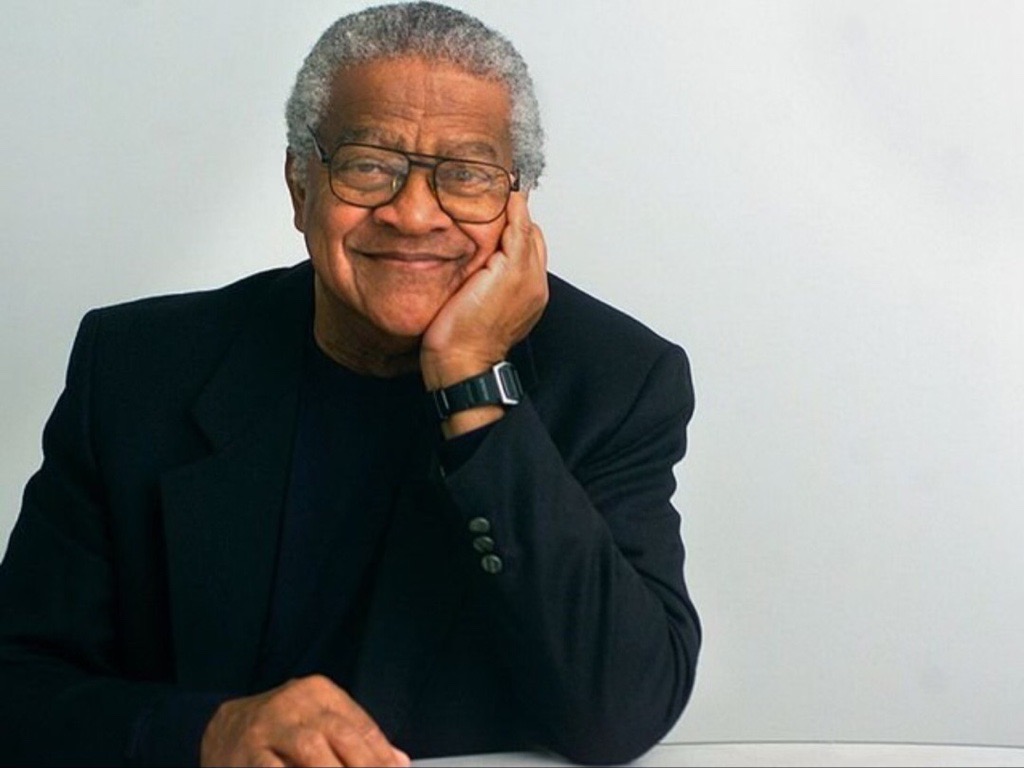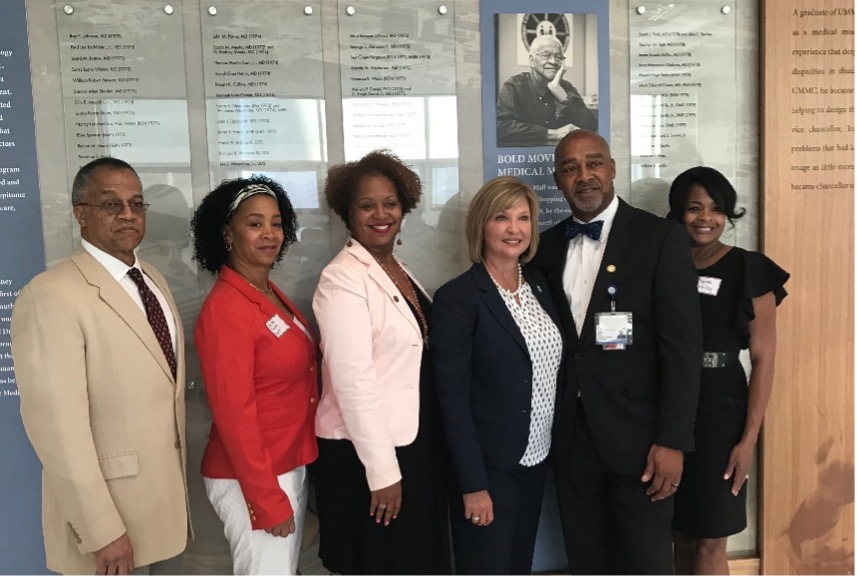Dr. Aaron Shirley, MD

January 3, 1933 – November 26, 2014
Dr. Aaron Shirley, a physician and pioneer for social justice in healthcare and civil rights, was the first African-American resident at the University of Mississippi Medical Center, co-founded the Jackson-Hinds Comprehensive Health Center, and developed and launched the Jackson Medical Mall and HealthConnect as part of his many contributions to make health care just and fair for residents of Mississippi and across the country.
In an interview with the Shaping the Narrative team on January 17, 2023, Dr. Shirley’s two sons, Kevin and Terrence Shirley, and two daughters, Erin Shirley Orey and Christal Shirley Porter, collaborated to share memories of their father’s teachings and accomplishments.
Leadership Journey
Confronting structural racism through a career in medicine
Dr. Aaron Shirley grew up in Jackson, MS in a house full of girls and women. His mother and all his sisters, especially the eldest who was a nurse, firmly planted the expectation that he should earn his living as a physician and contribute to the community through clinical practice.
He lived through the violence of Jim Crow that ensured separate and unequal medical facilities and services for Black people were consistently inferior, inadequate, or nonexistent compared to Whites. Thus, Shirley’s personal courage in his pursuit of a medical career was of vital importance.
Dr. Shirley earned his education from historically Black colleges and universities, Tougaloo College and Meharry School of Medicine. Barred from receiving hospital privileges due to segregation and discrimination, he opened a general practice and provided care as the only Black physician in Vicksburg, Mississippi. Dr. Shirley had a sincere desire to help all people no matter their circumstance. During house visits in Hinds and Warren County’s rural areas, Dr. Shirley was “concerned with the condition [his patients] were living in.” He incorporated public health ideas into his medical practice and taught families how to safely collect rainwater and manage wastewater. In 1965, he started his pediatrics residency at the University of Mississippi Medical Center.
Movement Moments
Activism as medicine: Dr. Shirley’s civil rights activism and transforming society to improve health
Both Dr. Aaron Shirley and his wife, Dr. Ollye Shirley, felt called to a lifelong mission of social justice and civil rights activism, which they shared with their children. Christal Shirley Porter, a year old at the time, retells stories of being held and cuddled by neighbors in her community as her mother led voter registration drives.
Their activism was not always received well. Kevin Shirley, the eldest son of Dr. Shirley, vividly recalls a specific instance:
“We heard some noise outside, and I went to the window [as] a child, just opened the curtains to see what was going on. And [my parents]- they chastised me about that! They said don’t ever run to the window when you hear something outside because… of the threats that the family had received.”
Ultimately, Kevin remembers his father had to teach him and his brother, Terrence, to shoot, to protect themselves while on house calls and at home. Terrence Shirley remembers his father tending to people who were beaten or survived house bombings, right in the Shirley’s living room.

Through these experiences, it became clear that infrastructure was needed to provide care and address the context of care for African Americans. Dr. Shirley began this work in the Mississippi Delta. Encouraged and supported by his wife Ollye, a Mound Bayou-native, Dr. Shirley provided medical services at the first rural health center in the United States: the Delta Health Center. Eager to bring community health centers to other parts of the state, he launched the first community health center in Jackson, Mississippi: The Jackson-Hinds Comprehensive Health Center. He also raised funding for a mobile unit in Utica. This old city bus was equipped to provide mobile care where health care was needed. Rising to the need, it was later converted into a permanent structure.
Building relationships to transform care: the Jackson Hinds Comprehensive Health Center (JHCHC)

One of the key lessons Dr. Shirley shared with his children was the importance of building authentic relationships to achieve social justice and accomplish mission-driven work. Dr. Shirley transformed the old city bus into the largest community health center in Central Mississippi with the support of powerful allies. Sargent Shriver, who was the first director of the Office of Economic Opportunity (OEO) and ran for president, was one such ally. Upon meeting Dr. Shirley, people recognized his sincerity, humility, and commitment to service, which formed the foundation of the alliances he built.
Among those with whom Dr. Shirley built relationships was former Secretary of Defense Donald Rumsfeld, who at the time served as director of the OEO in the Nixon administration. Shirley met Rumsfeld during the tragedy of the Jackson State killings May of 1970. This relationship proved essential to securing funding for the Jackson Hinds Community Heath Center (JHCHC), which had been vetoed at the state-level. To overcome segregationist opposition to funding JHCHC, Shirley and Rumsfeld creatively disguised checks as presents to ensure the approved funding would not be confiscated at the post office. In 1970, JHCHC was established with the funding Shirley secured. Focusing on community needs and learning from his house visits and activism, Dr. Shirley designed JHCHC to go beyond primary care by including dentistry, optometry, and housing and social services.
The health center revitalized the local economy and became the largest Black employer in Jackson, MS. The National Health Service Corps (NHSC) worked with Dr. Shirley to coordinate clinicians’ training at other emerging health clinics. “Pretty much every [Mississippi] African American physician… from 1971 to probably 1991 all came through Jackson Hinds at some point”, said Terrence Shirley, about his father’s work and humility, “You’d never know that he was behind the scenes doing it.”
Reimagining healthcare: the Jackson Medical Mall

In the 1990s, Dr. Shirley continued to advance health and set out to innovate the Jackson Medical Mall: a comprehensive healthcare one-stop-shop. The endeavor involved support from Jackson State University, Tougaloo College, UMMC, and the state of Mississippi. Dr. Shirley developed a rapport with Republican Senator Cochran, who supported the Medical Mall’s financing structure.
Now, the Medical Mall provides state of the art cancer, radiological, primary and secondary medical, dental, pharmacy, laboratory, social, financial, and educational services. Restaurants, the MS State Health Department, job training, and media services are also located in the mall. It has evolved to become a health care hub within Jackson.
Reflections for the future
Leading by action, Dr. Aaron Shirley’s commitment to his values, family, and mission to increase access to care transformed the healthcare landscape of Mississippi and the nation. His children remember Dr. Shirley as a sincere, humble, genuine public health advocate and quiet leader.
“He felt like this is who I am. This is what I want to do, and these are the skills I have, and I’m going use them to do all that I can to help others.” – Kevin Shirley
“Follow your passion, and when you do that, it’s easy for you, because it’s in the heart.” – Christal Shirley Porter
Awards and recognitions
At the age of 60, Dr. Shirley was awarded the MacArthur Fellowship in 1993. In 2013, Dr. Shirley was the Herbert W. Nickens Award Recipient. In 2015, the Mississippi Board of Trustees of the State Institutions of Higher Learning posthumously awarded Dr. Shirley with the Community Service Award.
Sources cited:
In Memoriam: Dr. Aaron Shirley 1933-2014 – University of Mississippi Medical Center (umc.edu)
Hope in the Wreckage – Audio & Photos – NYTimes.com
https://massleague.org/CHC/History.php
Our History | Delta Health Center
Donald H. Rumsfeld > Historical Office > Article View (defense.gov)
Jackson State: A Tragedy Widely Forgotten : NPR
Medical pioneer Dr. Aaron Shirley has died | Clarion Ledger
Mall History – Jackson Medical Mall
Aaron Shirley – MacArthur Foundation (macfound.org)
Herbert W. Nickens Award Recipients | AAMC
Aaron Shirley, M.D. posthumously receives Community Service Award – Ole Miss News